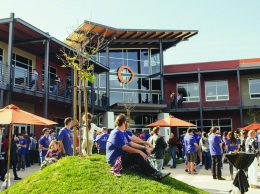COVID-19 layoffs skyrocket in Tri-Counties
IN THIS ARTICLE
- Latest news Topic
- Tony Biasotti Author
By Tony Biasotti Friday, April 10th, 2020
In the first month after the novel coronavirus arrived in the region, tens of thousands of people in the Tri-Counties lost their jobs when their workplaces shut or slowed, and experts predict April and May will bring unemployment rates unseen since the Great Depression.
The pandemic has touched every part of the tri-county economy, from the biggest businesses to the smallest. Every consumer-facing retail or service business, apart from those selling groceries, medication and other essentials, is shut down, and many have let their employees go, either permanently or as long as the shutdown lasts.
Getting a handle on the number of layoffs is difficult. Businesses with more than 75 employees are typically required to give 60 days notice of mass layoffs to the state and county, but the state has suspended that requirement due to the pandemic.
There have been many announced job cuts, though. Mindbody, the biggest tech employer on the Central Coast, laid off or furloughed as many as 300 people at its Santa Maria and San Luis Obispo offices. Mindbody provides software for gyms, yoga studios, spas and salons — businesses that are shut down all over world.
“We got hammered by this,” CEO Rick Stollmeyer told the Business Times. “Ninety-plus percent of customers were affected, across every vertical and every geography. We are down two thirds of our revenue.”
Until the pandemic, Mindbody employed about 2,000 people worldwide, 950 of them on the Central Coast. It has now cut its global workforce by more than one third.
Up and down the state, unemployment insurance claims and layoff notices skyrocketed in March. There were 139 mass layoff notices from March 1 through March 25 in California, totaling 18,998 jobs lost, more than 2.5 times the number of mass layoffs in all of February.
In the region, mass layoffs reported to the state since the pandemic arrived include 183 jobs lost at the Players Casino in Ventura; 37 jobs at Whitaker Construction Group in Paso Robles; 99 jobs at two car dealerships owned by Ventura Toyota; and 55 at the parent company of Brent’s Deli in Westlake Village. All were reported as temporary.
Many more layoffs went unreported, either because they were at small businesses or because the state is not enforcing its disclosure requirements during the current crisis. The extent of the damage won’t be known until the federal and state governments release their unemployment rates for April, which are based on household surveys.
And that those figures look to be very ugly. Bruce Stenslie, CEO of the Economic Development Collaborative in Ventura County, estimated in his organization’s latest labor market report that the April unemployment rate in Ventura County will be 22.6 percent.
Peter Rupert, the executive director of the UC Santa Barbara Economic Forecast Project, told the Business Times that he expects similarly high unemployment in Santa Barbara County.
If the only job loss in the county is half of the jobs in hospitality and retail, the unemployment rate will hit 15 percent, Rupert said; if two thirds of the people in those industries lose their jobs, the rate will approach 20 percent. And that doesn’t include any jobs lost in other sectors.
The California Lutheran University Center for Economic Forecasting is now projecting “a deep and enduring recession,” it said on April 2. Executive director Matt Fienup predicts a GDP decline in the second quarter of more than 20 percent, and the loss of more than 16 million jobs nationwide, more than double the number lost in the Great Recession.
State and federal governments are rolling out increased benefits and broadened eligibility for unemployment insurance, but that rollout hasn’t always been smooth.
AJ Copeland, a hairdresser who lives in Oxnard, lost her job at Comb Studio Salon in Camarillo on March 18, just a couple of days before the salon closed. It’s temporary, she hopes; the owner of the salon is pursuing U.S. Small Business Administration loans and planning to reopen when salons can operate safely again.
As an independent contractor who rented a chair at the salon, Copeland would ordinarily not be eligible for unemployment benefits because she wasn’t an employee. But the federal relief package passed in March made independent contractors eligible for unemployment for the first time, and Copeland applied a couple of weeks after her salon closed.
Like many people, she faced an overloaded online benefit portal, and she’s not sure what kind of benefits she’ll receive.
“I honestly have no clue if it will work out,” she said.
The strangest thing, Copeland said, is losing her job and not being able to look for a new one.
“It’s horrible,” she said. “Growing up in Boston, I got this sense that if you’re not actively being a member of society, then you’re kind of worthless.”
To stay busy, she’s been sewing face masks for her neighbors. Her husband is an essential employee at a defense contractor, so she thinks they can pay their bills for a couple of months. After that, things could get dicey.
The hardest-hit parts of the economy are the salons, restaurants, shops and other businesses that are shut down by state and local orders. But the crisis is already reaching into the public sector. The city of Santa Barbara was the first public agency to report major cuts, laying off about 250 hourly employees who ran the city’s after school programs. Those programs were cancelled when the schools closed.
Alex McIntyre, Ventura’s city manager, said his city hasn’t had to lay anyone off because its recreation programs are staffed by independent contractors, but it has eliminated those contracts for now.
Many city functions are essential, such as police and fire departments and water and sewer services. But cities will have to find a way to make cuts if their revenues drop, and right now, they’re falling through the floor — hotel bed taxes are nearly at zero, McIntyre said, and sales taxes will take a huge hit.
So far, most government workers are working from home and getting paid as they were before, but it the crisis drags on and cities, counties and special districts have to make cuts, “it would be a horrible disaster” for the region, McIntyre said.
“Ventura County’s No. 1 industry is government,” he said, pointing to both local agencies and the jobs generated by Naval Base Ventura County. “If that shuts down, we have a real mess on our hands.”
Related Articles
 Friday, October 14th, 2022
Friday, October 14th, 2022










